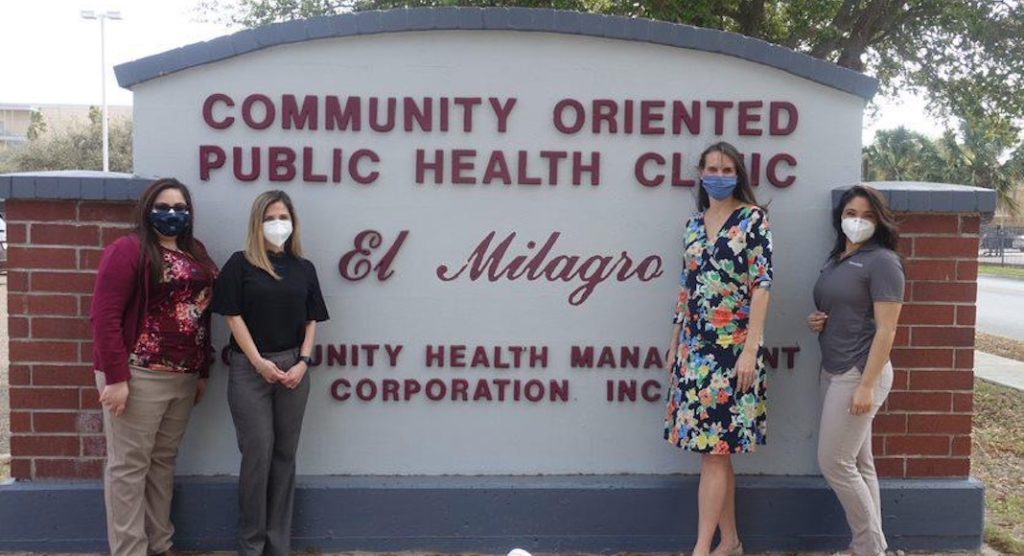
Mega Doctor News
By Dimitra Trejo
RIO GRANDE VALLEY, TEXAS – A team of UTRGV School of Medicine students, Master of Social Work students, and resident physicians are the recipients of the Association of American Medical Colleges AAMC Nurturing Experiences for Tomorrow’s Community Leaders (NEXT) Award to address COVID-19 and systemic racism in their communities.
The AAMC awarded five institutions $10,000 to develop or enhance a learning opportunity that seeks to improve community health and eliminate health disparities while applying population health leadership principles and promoting collaboration among diverse stakeholders.
The UTRGV team’s winning project partners with community safety-net clinics –
El Milagro Clinic and the HOPE Family Health Center – to develop a culturally competent public service announcement and the execution of their “¡Si se Puede!” campaign. The campaign is an interdisciplinary public health education campaign to address COVID-19 inequities, systemic racism, and mistrust of health systems.
The campaign also aims to connect Spanish speakers and the deaf and hard of hearing individuals in the Rio Grande Valley to information on COVID-19 prevention, treatment, and clinical trials while also increasing access to influenza vaccination.
“This $10,000 grant is really going to help our Hispanic serving institution in its mission to provide the community with the resources it needs,” said Dr. Chelsea Chang, UTRGV School of Medicine assistant professor.
“We will provide flu vaccines to safety-net clinics, including El Milagro Clinic and the HOPE Family Health Center, to reduce the spread of influenza in the RGV. The second part of the budget is about connecting with our community. The funds will allow us to distribute messaging to the Spanish speaking and deaf and hard of hearing communities using TV, radio, and social media promotion on COVID-19 prevention and treatment.”
The UTRGV team plans to meet its goals of providing more resources to the community through public service announcements and published cultural competence guides for healthcare centers throughout the state of Texas.
Chang said since the pandemic started, messaging to these communities has not always been ideal.
“With COVID-19 messaging we have seen that a lot can get lost in translation,” Chang said. “Through this work, the team is finding that Spanish messaging used to inform the public on pandemic resources has used a vocabulary level that may not be on par with the community that is intended to read it. We are trying to develop messaging that is clear and has a personal emotional impact.”
The safety-net clinics in the region that provide primary care, disease prevention, and behavioral healthcare services to medically indigent residents have been a great resource to the team in understanding exactly the kind of messaging to which the community responds.
“It’s been great for all of us, from faculty and students, to see the different views in health messaging,” Chang said. “What one of us thinks is clear messaging may not be what someone else thinks is clear. We are trying to reach out to everyone in the community and be sensitive to people and the unique challenges they face.”
Marisol Resendez, executive director for El Milagro Clinic, is thankful for the collaboration with UTRGV and the effort in educating residents to understand and grasp the life-saving information when it comes to COVID-19.
“This effort by Dr. Chang and her team is so important, and we have seen how misinformation around COVID-19 has affected our community causing confusion, anxiety and stress,” Resendez said. “Getting accurate information about COVID-19 prevention, treatment, research trials and vaccines that is relatable and easy to understand for our Spanish speaking community is essential in our fight against this virus. We are excited to be part of this project and hope to be of service in keeping our community well informed.”
Chang hopes the work being done to inform the community will have lasting impacts on the region.“We are grateful to the AAMC and UTRGV for allowing us to have this impact not only in the Valley but throughout the nation,” Chang said. “We are trying to put ourselves in other people’s shoes and hoping to make it easier to connect them with proper healthcare messaging they can understand and connect with emotionally to make decisions for themselves and for their families.”












